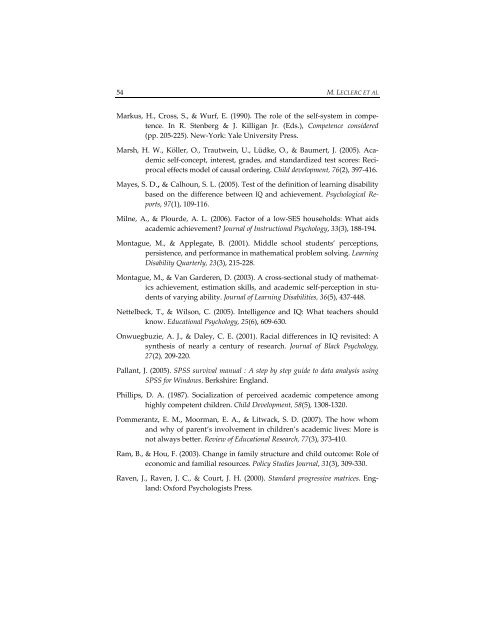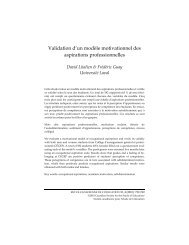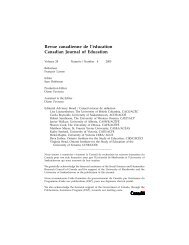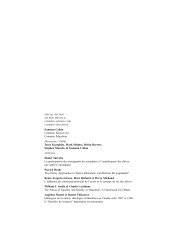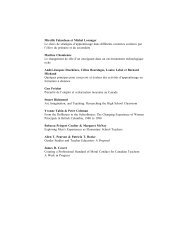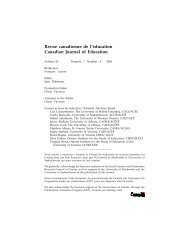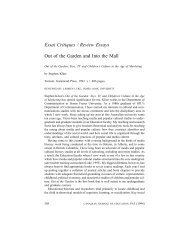Le sentiment de compétence, modérateur du lien entre le QI et le ...
Le sentiment de compétence, modérateur du lien entre le QI et le ...
Le sentiment de compétence, modérateur du lien entre le QI et le ...
Create successful ePaper yourself
Turn your PDF publications into a flip-book with our unique Google optimized e-Paper software.
54 M. LECLERC ET AL<br />
Markus, H., Cross, S., & Wurf, E. (1990). The ro<strong>le</strong> of the self‐system in compe‐<br />
tence. In R. Stenberg & J. Killigan Jr. (Eds.), Comp<strong>et</strong>ence consi<strong>de</strong>red<br />
(pp. 205‐225). New‐York: Ya<strong>le</strong> University Press.<br />
Marsh, H. W., Köl<strong>le</strong>r, O., Trautwein, U., Lüdke, O., & Baumert, J. (2005). Aca‐<br />
<strong>de</strong>mic self‐concept, interest, gra<strong>de</strong>s, and standardized test scores: Reci‐<br />
procal effects mo<strong>de</strong>l of causal or<strong>de</strong>ring. Child <strong>de</strong>velopment, 76(2), 397‐416.<br />
Mayes, S. D., & Calhoun, S. L. (2005). Test of the <strong>de</strong>finition of <strong>le</strong>arning disability<br />
based on the difference b<strong>et</strong>ween IQ and achievement. Psychological Re‐<br />
ports, 97(1), 109‐116.<br />
Milne, A., & Plour<strong>de</strong>, A. L. (2006). Factor of a low‐SES households: What aids<br />
aca<strong>de</strong>mic achievement? Journal of Instructional Psychology, 33(3), 188‐194.<br />
Montague, M., & App<strong>le</strong>gate, B. (2001). Midd<strong>le</strong> school stu<strong>de</strong>nts’ perceptions,<br />
persistence, and performance in mathematical prob<strong>le</strong>m solving. <strong>Le</strong>arning<br />
Disability Quarterly, 23(3), 215‐228.<br />
Montague, M., & Van Gar<strong>de</strong>ren, D. (2003). A cross‐sectional study of mathemat‐<br />
ics achievement, estimation skills, and aca<strong>de</strong>mic self‐perception in stu‐<br />
<strong>de</strong>nts of varying ability. Journal of <strong>Le</strong>arning Disabilities, 36(5), 437‐448.<br />
N<strong>et</strong>telbeck, T., & Wilson, C. (2005). Intelligence and IQ: What teachers should<br />
know. E<strong>du</strong>cational Psychology, 25(6), 609‐630.<br />
Onwuegbuzie, A. J., & Da<strong>le</strong>y, C. E. (2001). Racial differences in IQ revisited: A<br />
synthesis of nearly a century of research. Journal of Black Psychology,<br />
27(2), 209‐220.<br />
Pallant, J. (2005). SPSS survival manual : A step by step gui<strong>de</strong> to data analysis using<br />
SPSS for Windows. Berkshire: England.<br />
Phillips, D. A. (1987). Socialization of perceived aca<strong>de</strong>mic comp<strong>et</strong>ence among<br />
highly comp<strong>et</strong>ent children. Child Development, 58(5), 1308‐1320.<br />
Pommerantz, E. M., Moorman, E. A., & Litwack, S. D. (2007). The how whom<br />
and why of parent’s involvement in children’s aca<strong>de</strong>mic lives: More is<br />
not always b<strong>et</strong>ter. Review of E<strong>du</strong>cational Research, 77(3), 373‐410.<br />
Ram, B., & Hou, F. (2003). Change in family structure and child outcome: Ro<strong>le</strong> of<br />
economic and familial resources. Policy Studies Journal, 31(3), 309‐330.<br />
Raven, J., Raven, J. C., & Court, J. H. (2000). Standard progressive matrices. Eng‐<br />
land: Oxford Psychologists Press.


